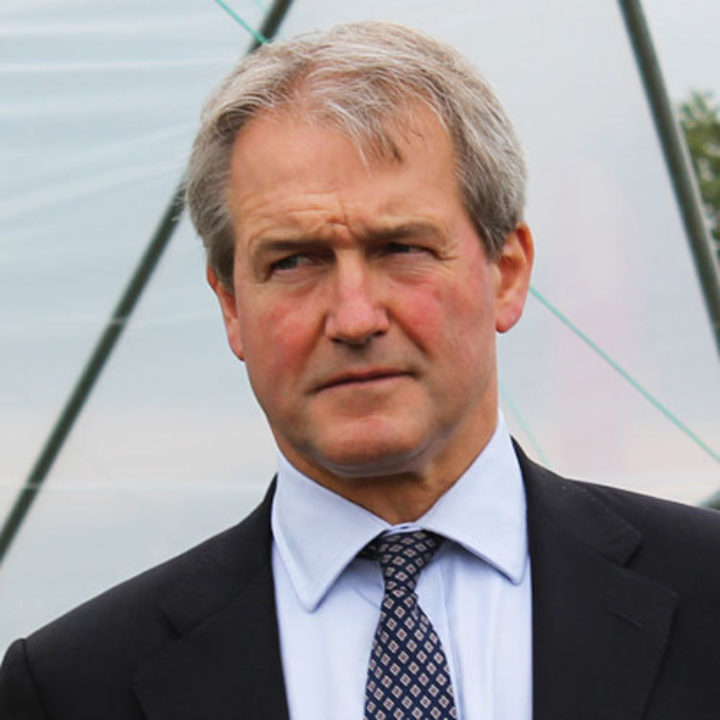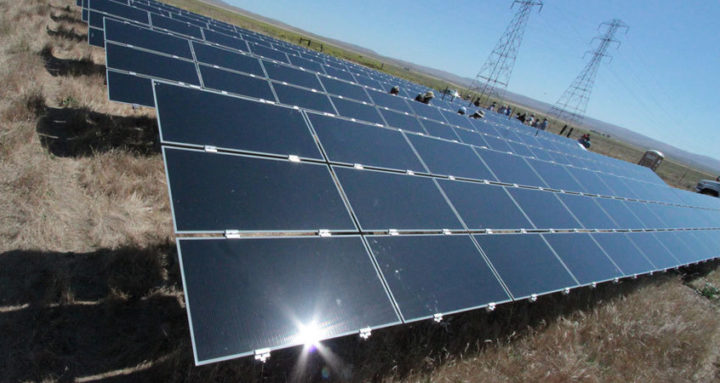Owen Paterson - the top 10 questions
Former Minister presents a strong vision on energy and climate reform - so what needs examining?
By Richard Black
Share
Last updated:
By Richard Black, ECIU Director
Owen Paterson’s intervention on UK climate and energy policy is undoubtedly the most radical verbal challenge to the cross-party consensus that we have seen in recent years.

If he is serious in demanding a repeal of the Climate Change Act – and we must presume that he is – and if journalism is a serious business, it is only right that his proposals be properly scrutinised.
So, for any reporters, commentators, leader-writers and broadcast interviewers who might be looking at the issue this week, here’s my ‘cut-out-and-keep’ guide to 10 questions that they could profitably ask Mr Paterson and his supporters.
If you’re in a real hurry, just skip to No 10 (as in the tenth question, not 10 Downing St – although come to think of it, asking what people there think of Mr Paterson's intervention, given the Prime Minister’s recent speech on climate change in New York, could be a good idea too).
1 Where is the evidence that the UK will experience blackouts unless emission targets are scrapped?
None of the major players in the field – DECC, the National Grid, Ofgem – believe the lights are about to go out, although it is true that the amount of ‘headroom’ between peak demand and peak supply has been falling.
The Coalition government has just opened its first capacity market auction – a process designed explicitly to ensure that the ‘lights stay on’ in an era of increasing renewable and nuclear generation. The capacity market can award contracts for 15 years; nuclear stations such as Hinkley C are set to generate for 35 years with price support. So what evidence is there to support the ‘lights going out’ thesis?
2 What evidence is there that the power sector is where the UK is missing its emission targets?
The Committee on Climate Change says that current policies across the economy may not reduce emissions enough to meet the third and fourth carbon budgets (covering the period 2018-2027). Its progress report lists deficiencies in industrial and domestic energy efficiency policies, transport, and the power sector.
However, for the last-named, the issue that the Committee raises is simply that the government is not giving investors confidence beyond 2020. Correcting this, then, is a question of persuading the Chancellor to commit to a financial support regime that looks more than five years ahead.
3 Costs to consumers will rise ‘dramatically’ in the short and medium term
DECC projections have the average household energy bill rising by about 6% between now and 2020. (That’s energy, not just electricity.) Rising soclal and environmental levies are projected to give a small upwards push – but the impact of those levies, in terms of reducing energy waste, will exert a downwards force on the average bill.
Meanwhile the main determinant of electricity prices is the wholesale cost of gas. This is hardly the most predictable of factors. For 2020, the energy-intensive users group EEF sees power prices rising by 47%, while analysts Moody’s have it staying roughly constant. Making sense of DECC’s projections is – well, challenging. So, where is the firm evidence for ‘dramatic’ rises?
4 What’s happened to the sun?

None of the newspaper coverage so far has mentioned solar power. This is the fastest-growing type of renewable, and costs are tumbling – down by about two-thirds since 2011. So one might expect solar to form a progressively greater proportion of the UK’s renewables portfolio as the years go by. This would obviously affect the number of wind farms being built, and electricity costs. So its absence from the discourse is surprising.
5 Meeting the climate change targets will cost £1.1 trillion
The 2012 study [pdf link] from which this figure appears to originate is odd in at least two ways. Firstly, it assumes that onshore wind will be the cheapest form of renewable, which may not be the case (see above). Secondly, it envisages few renewables being built after 2030.
Even so, it puts the cost of keeping the lights on to 2050 without any climate change targets at £760 billion. With an emissions target but no renewables target, it comes to £960bn. The figure of £1.1 trillion comes if you have emissions and renewables targets. So the marginal costs are not as big as that £1.1 trillion figure might imply, especially when you consider that they’re spread over nearly 40 years.
6 Where are those small nuclear reactors?
Mr Paterson advocates using lots of small-scale nuclear reactors around the UK. The Telegraph coverage speaks of using reactors found in submarines. It’s worth recalling that pressurised water reactors (PWRs), which now make up about 80% of the global reactor fleet, started life in submarines – the first civilian reactor in the US at Shippingport was developed from a submarine PWR.

So, companies have at all times been able to press on with small nukes. They have focussed on big ones because they think the economics are better.
Some companies are now talking of developing new types of small-scale reactor for commercial power generation - but at the moment, it is just talk. Babcock and Wilcox just announced that it is scaling back development due to lack of investor interest. That followed a similar announcement from Westinghouse in January. The main loci of progress appear to lie in Russia, China and India.
Many designs for small reactors are technically intriguing, and in principle could be safer than the big ones we have now. But if western investors are not interested, how could they be developed, safety-checked and introduced in the UK other than by a state-owned utility?
7 Ministers should exercise the clause in the Climate Change Act that allows them to suspend it without a vote
There isn't such a clause - at least, not one using the term 'suspend'. Ministers can amend the long-term emission reduction target (80% by 2050) - but only if ‘there have been significant developments in (i) scientific knowledge about climate change, or (ii) European or international law or policy, that make it appropriate to do so’. Ministers must also take into account advice from the Committee on Climate Change.
So how would they be able to suspend the Act, given that little has changed in the science, little has changed in the European political arena, and more and more countries outside Europe are looking to constrain their emissions?
8 Scrapping the Climate Change Act would offer an opportunity for the Conservatives to ‘steal one of UKIP’s most popular campaigns’
This is a surprising claim. For one thing, renewables are popular – about 80% support [pdf link] across the board, with solar ahead of wind – and only 5% of the population opposed. 59% would be happy to have a large renewable project near their homes. And it’s been noticeable that Nigel Farage, that most astute of rhetoricians, has said little about renewables or climate change in his recent pronouncements, preferring to concentrate on immigration, Europe, and people’s general sense of disenfranchisement from politics.
Meanwhile, a recent petition to repeal the Climate Change Act garnered just 1,531 signatures. So how is Mr Paterson gauging ‘popularity’?
9 How does it feel being part of the ‘green blob’?
(Ok, so this is a tongue-in-cheek question, but still…) Demand management and combined heat and power (CHP), both of which Mr Paterson advocates, are favourites of the ‘green’ camp. But the Coalition has sidelined demand management as a potential ‘keep-the-lights-on’ policy in favour of extending fossil fuel generation, and is giving limited support to CHP.
Will we see Mr Paterson manning the barricades on these issues alongside Friends of the Earth, with the Big Six energy providers – who generally hate the idea of demand management – on the other side?
10 Where does the Climate Change Act say that the UK has to invest in renewables?
I have been through the Climate Change Act line by line, and can find no mention of renewables – or any other specific technology. The Act is, in fact, studiously technology-neutral. So, how does Mr Paterson justify his thesis that the Act needs repealing because it mandates wind farms above other options?
‘Rigorous’, ‘forensic’, ‘probing’: can’t wait for the questioning to start. Owen Paterson is a serious politician who has thrown more than a pebble into this particular pond. His policy proposals deserve nothing less than serious questions.
Share